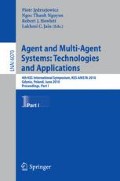Abstract
Building groups of students of similar features enables to suggest teaching materials according to their member needs. In the paper, it is proposed the agent-based recommender system, which, for each new learner, suggests the student group of similar profiles and consequently indicates suitable learning resources. It is assumed that learners may be characterized by cognitive styles, usability preferences or historical behavior, represented by nominal values. It is considered to build recommendations by using Naïve Bayes algorithm. The performance of the technique is validated on the basis of data of learners described by cognitive traits such as dominant learning style dimensions. Tests are done for real data of different groups of similar students as well as of individual learners.
Access this chapter
Tax calculation will be finalised at checkout
Purchases are for personal use only
Preview
Unable to display preview. Download preview PDF.
References
Zhang, H.: The optimality of Naïve Bayes. In: Proc. of the 17th FLAIRS Conf., Florida (2004)
Zaïane, O.R.: Web usage mining for a better web-based learning environment. In: Proc. of Conf. on Advanced Technology for Education, Banff, AB, pp. 60–64 (2001)
Brusilovsky, P., Peylo, C.: Adaptive and intelligent web-based educational systems. International Journal of Artificial Intelligence in Education 13, 156–169 (2003)
Santally, M.I., Alain, S.: Personalisation in web-based learning environments. International Journal of Distance Education Technologies 4, 15–35 (2006)
Stash, N., Cristea, A., De Bra, P.: Authoring of learning styles in adaptive hypermedia: Problems and solutions. In: Proc. WWW Conf., NY, pp. 114–123 (2004)
Tang, T., McCalla, G.: Smart recommendation for an evolving e-learning system. International Journal on E-Learning 4, 105–129 (2005)
Zakrzewska, D.: Using clustering technique for students’ grouping in intelligent e-learning systems. In: Holzinger, A. (ed.) USAB 2008. LNCS, vol. 5298, pp. 403–410. Springer, Heidelberg (2008)
Yang, F., Han, P., Shen, R., Hu, Z.: A novel resource recommendation system based on connecting to similar e-learners. In: Lau, R.W.H., Li, Q., Cheung, R., Liu, W. (eds.) ICWL 2005. LNCS, vol. 3583, pp. 122–130. Springer, Heidelberg (2005)
Shen, R., Han, P., Yang, F., Yang, Q., Huang, J.: Data mining and case-based reasoning for distance learning. Journal of Distance Education Technologies 1, 46–58 (2003)
Romero, C., Ventura, S., Delgado, J.A., De Bra, P.: Personalized links recommendation based on data mining in adaptive educational hypermedia systems. In: Duval, E., Klamma, R., Wolpers, M. (eds.) EC-TEL 2007. LNCS, vol. 4753, pp. 292–306. Springer, Heidelberg (2007)
Zaïane, O.R.: Building a recommender agent for e-learning systems. In: Proc. of the 7th Int. Conf. on Computers in Education, Auckland, New Zeland, pp. 55–59 (2002)
Minaei-Bidgoli, B., Tan, P., Punch, W.: Mining interesting contrast rules for a web-based educational system. In: The Twenty-First International Conference on Machine Learning Applications, pp. 1–8 (2004)
García, E., Romero, C., Ventura, S., de Castro, C.: An architecture for making recommendations to courseware authors using association rule mining and collaborative filtering. Use Model. User-Adap. 19, 99–132 (2009)
Romero, C., Ventura, S.: Educational data mining: a survey from 1995 to 2005. Expert Syst. Appl. 33, 135–146 (2007)
Baker, R., Corbett, A., Koedinger, K.: Detecting student misuse of intelligent tutoring systems. In: Lester, J.C., Vicari, R.M., Paraguaçu, F. (eds.) ITS 2004. LNCS, vol. 3220, pp. 531–540. Springer, Heidelberg (2004)
Arroyo, I., Woolf, B.P.: Inferring learning and attitudes from a Bayesian Network of log file data. In: Proc. of the 12th Int. Conf. on Artificial Intelligence in Education, pp. 33–40 (2005)
García, P., Amandi, A., Schiaffino, S., Campo, M.: Evaluating Bayesian networks’ precision for detecting students’ learning styles. Comput. Educ. 49, 794–808 (2007)
Hamalainen, W., Suhonen, J., Sutinen, E., Toivonen, H.: Data mining in personalizing distance education courses. In: World Conference on Open Learning and Distance Education, pp. 1–11 (2004)
Beck, J., Woolf, B.: High-level student modeling with machine learning. In: Proc. of the 5th Int. Conf. on Intelligent Tutoring System, pp. 584–593 (2000)
Lowd, D., Domingos, P.: Naive Bayes models for probability estimation. In: Proceedings of 22nd International Conference on Machine Learning, Bonn, Germany (2005)
Murphy, K.P.: Naive Bayes classifiers, http://www.cs.ubc.ca/murphyk/Teaching/CS340-Fall06/reading/NB.pdf
Kotsiantis, S.B.: Supervised machine learning: a review of classification. Informatica 31, 249–268 (2007)
Brusilovsky, P.: Adaptive hypermedia. Use Model. User-Adap. 11, 87–110 (2001)
Felder, R.M., Silverman, L.K.: Learning and teaching styles in engineering education. Eng. Educ. 78, 674–681 (1988)
Kuljis, J., Liu, F.: A comparison of learning style theories on the suitability for e-learning. In: Proc. of IASTED Conference on Web Technologies, Applications, and Services, pp. 191–197. ACTA Press (2005)
Zakrzewska, D.: Student groups modeling by integrating cluster representation and association rules mining. In: van Leeuven, J., et al. (eds.) SOFSEM 2010. LNCS, vol. 5901, pp. 743–754. Springer, Heidelberg (2010)
Han, J., Kamber, M.: Data Mining: Concepts and Techniques, 2nd edn. Morgan Kaufmann Publishers, San Francisco (2006)
Zakrzewska, D.: Validation of cluster analysis techniques for students’ grouping in intelligent e-learning systems. In: Proc. of 14th International Congress of Cybernetics and Systems of WOSC, Wroclaw, Poland, pp. 893–901 (2008)
Author information
Authors and Affiliations
Editor information
Editors and Affiliations
Rights and permissions
Copyright information
© 2010 Springer-Verlag Berlin Heidelberg
About this paper
Cite this paper
Zakrzewska, D. (2010). Building Group Recommendations in E-Learning Systems. In: Jędrzejowicz, P., Nguyen, N.T., Howlet, R.J., Jain, L.C. (eds) Agent and Multi-Agent Systems: Technologies and Applications. KES-AMSTA 2010. Lecture Notes in Computer Science(), vol 6070. Springer, Berlin, Heidelberg. https://doi.org/10.1007/978-3-642-13480-7_41
Download citation
DOI: https://doi.org/10.1007/978-3-642-13480-7_41
Publisher Name: Springer, Berlin, Heidelberg
Print ISBN: 978-3-642-13479-1
Online ISBN: 978-3-642-13480-7
eBook Packages: Computer ScienceComputer Science (R0)

